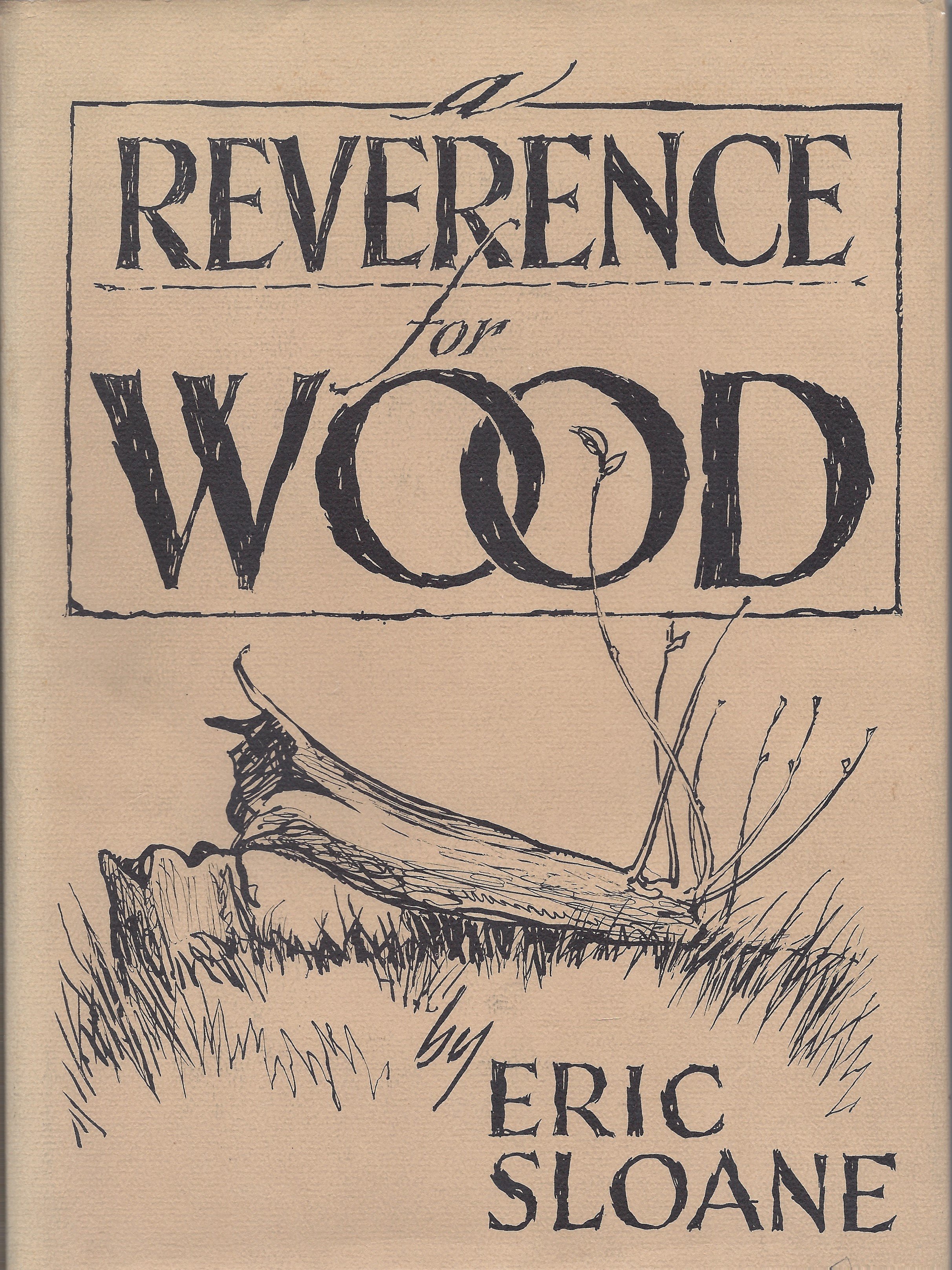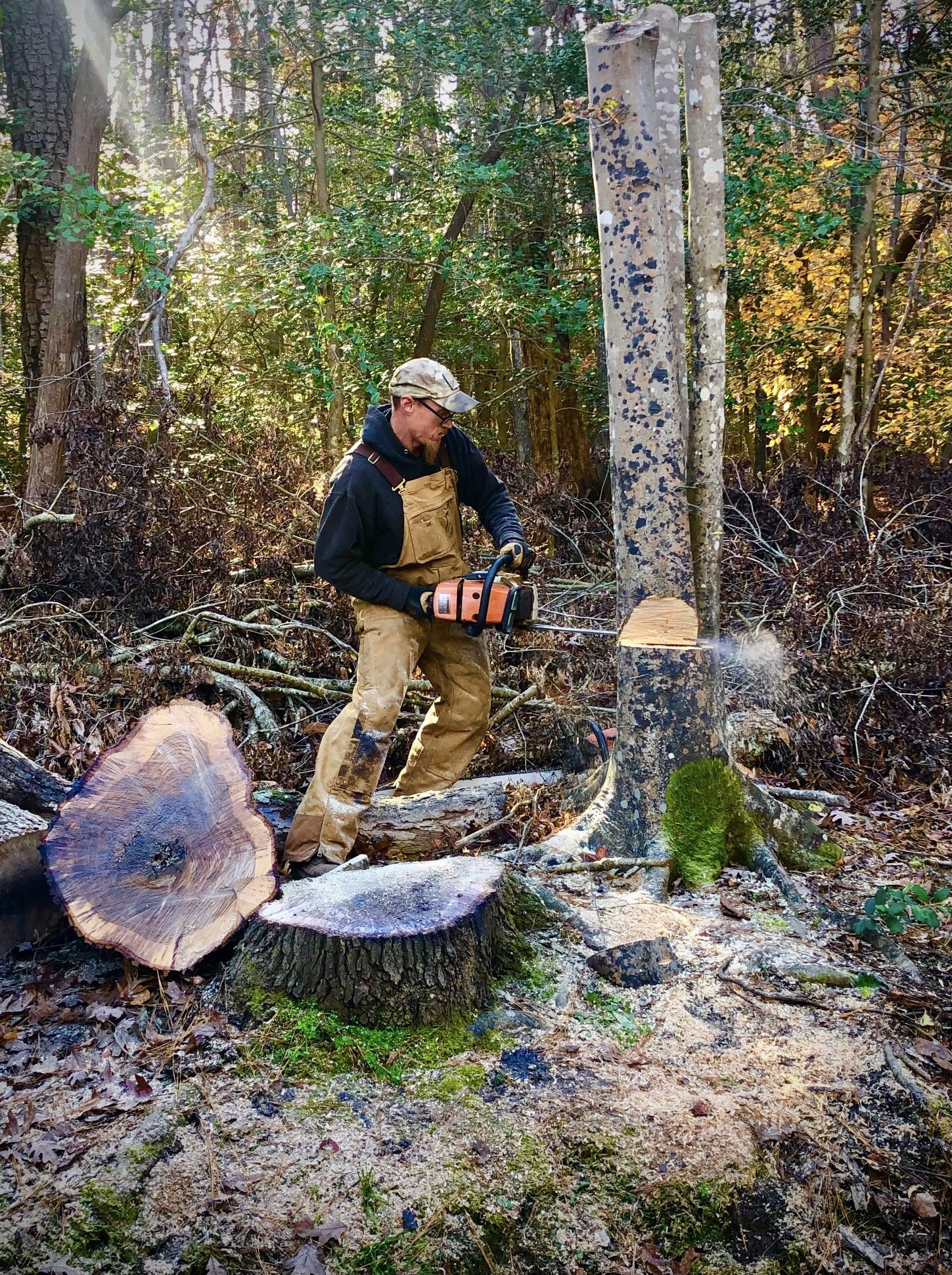In the beginning, all the world was America.
John Locke, Second Treatise on Government
My dear friends,
When I was a boy of about ten, a book entered our Iowa home that made a lasting impression on me. It was called A Reverence for Wood, by the American antiquarian and illustrator, Eric Sloane.
I would learn much later that Sloane's given name was Everard, but that, when he was a young art student in New York, he had taken the name Eric from the middle two syllables of "Am-eric-a." The idea of America would remain central to Sloane's mature work, which Andrew Wyeth called "an Artistic Treasure of Americana."
I was reminded of Eric Sloane and that book last weekend. I spent Saturday in the woods with two new friends of the Foundation, Ryan Penner and Randy Thompson. Ryan has generously volunteered his expert timber milling services to us, and is now at work providing master carpenter Garland Wood with all the necessary timbers and scantling to build our Virginia Frame. Ryan is also volunteering the southern yellow pine logs from which most of the individual timbers will be cut, save only the heavy white oak ground sills.
The white oak was a problem. Ryan had none on hand. White oak has become very scarce and expensive in recent years, owing to the rapid growth of craft brewing, which employs white oak as the wood of choice for barrels. As I know from the coopers here at Colonial Williamsburg, oak has been the favorite of barrel makers through the ages, for a wide variety of applications. Its strength and malleability, its water-tight cell structure, even its imparted taste, make it the perfect wood for barrel staves. For much the same reasons— though I don't expect anyone to be tasting our timber frame—it is also the wood of choice for framers when it comes to ground sills, which must combine great strength with natural rot resistance. The sills are the horizontal members in a frame that sit nearest the ground, supporting the rest of the structure.
So, last week, Ryan's friend Randy came to the rescue and volunteered four fallen white oaks from his property deep in the woods of Gloucester County, across the York River from Williamsburg. Randy and Ryan are both combat veterans, Randy of the Air Force and Ryan of the Navy. Technically, they spent their service careers as "combat engineers," undertaking heavy construction projects in combat zones. The two friends met at the local chapter of the VFW. That is "Veterans of Foreign Wars" for those of you too young to remember.
Ryan and Randy have the quiet, formal manners of the men I grew up around, partly born of hard experience, often of life on the farm, expressed through the rhythm of the seasons as a certain reverence for the woods. With little talk and less fuss, we spent the day cutting, chaining, and hauling three or four tons of prime white oak out of the forest and onto a trailer. I say we, but I mean they. I was mostly a bystander in the drama. Still, to be out in the woods again to some solemn purpose, to witness the passing of wooded life to earth in preparation for a new existence, was in some ways to be renewed myself. Trees are only trees, I suppose. Frames are only frames. But there is a quality in the woods and things made from wood that is not entirely to be taken in vain. "In the woods we return to reason and faith," as Mr. Emerson said.
In the timber practice Ryan has crafted for himself, he almost never takes a living tree down. Trees are felled every day in this world, for good reasons and for no reason at all. Ryan accepts the inevitability of such casualties, and does what he can to see that they are suffered to some worthy purpose. He is a gleaner of the modern landscape, much as we were at Innermost House. In seven years of living "in a world lit only by fire," we never once had to fell a living tree. By living modestly and treading lightly, we lived at peace with the landscape.
Jeff Klee is now providing Garland with the last dimensioned drawings and full-size details he requires. Randy has provided the white oak and Ryan the yellow pine he is now milling to specification on his band saw, the 19th century heir to the pit saws of earlier times. America was different from Europe in the beginning. It was made of wood, not stone. It was born of the eternally returning life of the woods, of a reverence for the passingness of things. It was a kind of echo of ancientmost ages. "In the beginning, all the world was America."
Yours always,
Michael
The Innermost House Foundation is an entirely volunteer organization
dedicated to renewing transcendental values for our age.
IMAGES
Eric Sloane, A Reverence for Wood, 1965
M. Lorence: Ryan Penner in Gloucester woods
QUOTATIONS
”In the beginning. . .” John Locke, Second Treatise on Government


